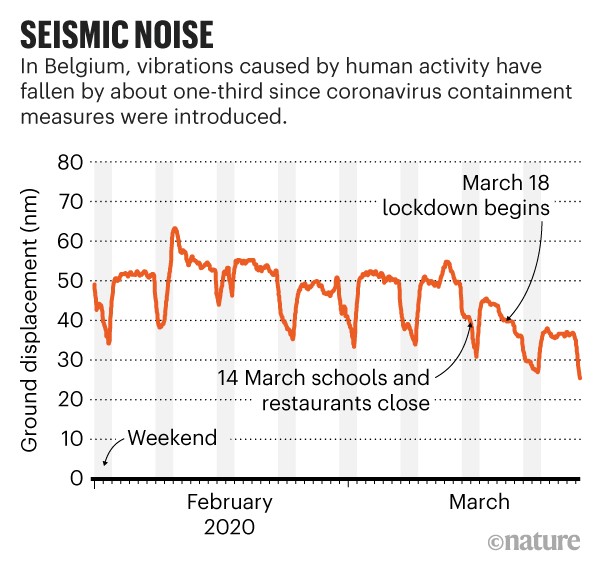COVID-19 Responsible for One Positive Outcome : Global Sound Reduction : "Anthropause"
"We could actually see a very sharp cutoff starting in China and Italy and then everywhere else as the pandemic spread and the policies and the lockdown spread."
"There is a different amount of background noise to start with. But if you look at the percentage decrease, people in Vancouver stayed at home much faster."
"We're getting a much better understanding of what these human-generated wave shapes are, which is going to make it easier in the future to be able to filter them back out again."
Mika McKinnon, study co-author. Geophysicist, adjunct professor, department of earth, ocean and atmospheric sciences, University of British Columbia
"We have a pod going by and sometimes you just hear a single whale vocalizing and sometimes they're all chatting at the same time."
"We don't necessarily know how to interpret that."
Richard Dewey, associate director of science, Ocean Networks Canada, University of Victoria
Abstract
Human activity causes vibrations that propagate into the ground as high-frequency seismic waves. Measures to mitigate the COVID-19 pandemic caused widespread changes in human activity, leading to a months-long reduction in seismic noise of up to 50%. The 2020 seismic noise quiet period is the longest and most prominent global anthropogenic seismic noise reduction on record. While the reduction is strongest at surface seismometers in populated areas, this seismic quiescence extends for many kilometers radially and hundreds of meters in depth. This provides an opportunity to detect subtle signals from subsurface seismic sources that would have been concealed in noisier times and to benchmark sources of anthropogenic noise. A strong correlation between seismic noise and independent measurements of human mobility suggests that seismology provides an absolute, real-time estimate of population dynamics.
 |
| As the pandemic wears on, study authors say data from the quiet period will help scientists detect more earthquakes and better differentiate between human-caused and natural seismic noises. (The Associated Press) |
 |
| Underwater frequencies effect marine mammals. Photo: Juergen Ritterbach/Alamy |
Silence was palpable its quiet level seen reflected in data sourced from an abandoned mine shaft deemed to represent one of the quietest places on Earth, an abandoned mine shaft in Germany. Noise levels plummeted when the province of British Columbia closed schools, then bars, restaurants and other social establishments, according to a seismic station located in Vancouver. Seismic sound dropped later and returned earlier in Seattle, explained Ms.McKinnon.
It is anticipated that data from this quiet period will be of assistance to scientists, enabling them to detect a greater number of earthquakes and to improve methods of differentiating between natural seismic sounds and those caused by human activity. While the latest data may not help in predicting if and when earthquakes will occur, scientists will be able to acquire a deeper insight into the seismology of the planet and its volcanic activity.

The data does perform a useful function in demonstrating that human activity is having far less of an impact on noise levels around the world; not by choice but through the circumstantial effect of coping with a global pandemic, in practising practical avoidance of infection. The noise reduction is having its impact on Earth's oceans, explained Richard Dewey, the pandemic bringing the opportunity for marine acoustic researchers to study the ocean free of noise pollution from massive tankers and cruise ships, whale watching and commercial fishing vessels.
The recovery of endangered southern resident killer whales -- also known as orcas -- will be enhanced by a quieter ocean. Returning each year to the Salish Sea around southern Vancouver Island, the whales are in serious decline, resulting from the hazards they face in an ocean environment complicated with man-made noise confusing to the whales, and presenting a morbid danger of collisions between whales and ships.
It is generally agreed among ocean specialists that whales could communicate with each other, navigate and assess their environment and acquire food more efficiently and effectively should the ocean be quieter. Researchers are set to examine data from before, during and after the current quiet period to determine whether distinctions between the meaning, frequency and density of the orcas' calls can be interpreted.
 |
Labels: COVID-19, Lockdown, Noise Reduction, Ocean Traffic

0 Comments:
Post a Comment
<< Home